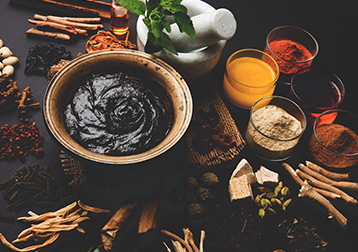Ayurvedic Healing

Ayurvedic Healing
Embracing Holistic Health Through Timeless Wisdom
Ayurvedic healing, a traditional approach deeply rooted in ancient wisdom, offers a holistic perspective on health and well-being. In this blog post, we will explore the significance of Ayurvedic practices and how they can provide transformative experiences that foster holistic health and vitality.
What is Ayurvedic Healing?
Ayurvedic healing is a comprehensive system of medicine that originated in India thousands of years ago. It encompasses a range of holistic practices aimed at promoting balance and harmony within the body, mind, and spirit. Ayurveda emphasizes the interconnectedness of all aspects of life and offers personalized approaches to health and healing based on an individual’s unique constitution.
How Can Ayurvedic Healing Help You?
Ayurvedic healing can help individuals achieve optimal health and well-being by addressing imbalances and supporting the body’s natural healing mechanisms. Through practices such as herbal remedies, dietary modifications, and lifestyle adjustments, Ayurveda seeks to restore harmony and vitality, promoting a sense of wholeness and balance.
What is Ayurvedic Healing Good For?
Ayurvedic healing is particularly beneficial for individuals seeking natural and holistic approaches to addressing various health concerns, including stress management, digestive issues, and emotional well-being. It offers a comprehensive framework for understanding the root causes of imbalances and provides tailored solutions to promote overall wellness.
Benefits of Ayurvedic Healing
The benefits of Ayurvedic healing include improved digestion, enhanced vitality, and emotional resilience. By incorporating personalized dietary recommendations, herbal supplements, and mindfulness practices, individuals may experience heightened energy levels, mental clarity, and a greater sense of inner harmony.
What to Expect from Ayurvedic Healing with a Practitioner
When working with an Ayurvedic practitioner, individuals can expect a thorough assessment of their unique constitution, or dosha, followed by personalized recommendations for dietary modifications, herbal remedies, and lifestyle adjustments. Practitioners may also incorporate practices such as yoga, meditation, and detoxification therapies to support holistic healing.
Final Thoughts
Ayurvedic healing represents a timeless and holistic approach to health and well-being, offering individuals a pathway to harmony, vitality, and holistic health. Through its profound wisdom and personalized practices, Ayurveda continues to guide individuals towards a balanced and fulfilling life.
References:
- Sharma, H., Chandola, H. M., Singh, G., Basisht, G. (2015). Utilization of Ayurveda in health care: An approach for prevention, health promotion, and treatment of disease. Journal of Traditional and Complementary Medicine.
- Patwardhan, B., Warude, D., Pushpangadan, P., Bhatt, N. (2005). Ayurveda and traditional Chinese medicine: A comparative overview. Evidence-based Complementary and Alternative Medicine.
- Rastogi, S., Kulshreshtha, D. K. (1992). Reversal of aging and immunomodulation in Ayurveda. Journal of Ethnopharmacology.
Books:
- Lad, V. (1998). The Complete Book of Ayurvedic Home Remedies. Three Rivers Press.
- Frawley, D. (2000). Ayurveda and the Mind: The Healing of Consciousness. Lotus Press.
- Svoboda, R. (1992). Prakriti: Your Ayurvedic Constitution. Lotus Press.
FAQ on Ayurvedic Healing
Welcome to our Frequently Asked Questions (FAQ) section. Here, we aim to provide clear and concise answers to common queries you may have about this particular healing modality. Whether you’re new to this practice or seeking deeper insights, our FAQs are designed to help enhance your understanding and support your journey toward holistic wellness. If you have a general question that’s not covered below, please feel free let us know.
In Ayurveda, a dosha refers to one’s unique mind-body constitution, categorized as Vata, Pitta, or Kapha, with each dosha governing specific bodily functions.
Ayurvedic dietary recommendations are tailored to an individual’s dosha, aiming to restore balance and support optimal digestion and nutrient absorption.
Ayurvedic practitioners often recommend herbs such as ashwagandha, turmeric, and triphala for their therapeutic properties in promoting overall health and wellness.
Ayurveda offers holistic approaches to stress management, including mindfulness practices, herbal remedies, and lifestyle modifications tailored to an individual’s dosha.
Since Ayurvedic treatments look at the entire system – mind, body, and soul – it is important to remember that experiences will vary depending on what modality you are implementing. The timeline for experiencing benefits may vary, but many individuals report gradual improvements in their overall well-being after embracing Ayurvedic healing practices.



